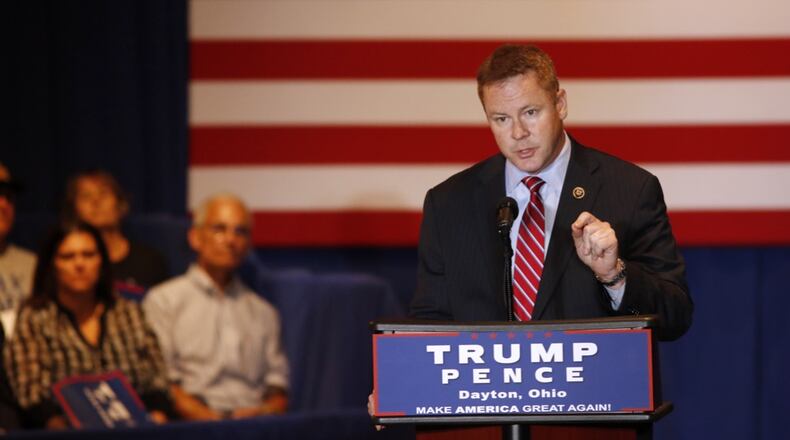That could mean the U.S. Department of Agriculture would relocate closer to farming communities, and the U.S. Department of Commerce would move closer to the country’s financial district in New York City.
MORE: Get the latest political news at Journal-News.com
Davidson’s bill, if approved, would require the heads of each executive federal agency to submit a plan by September 2018 to relocate, and put the plan into action by September 2023.
He said this bill is likely to have a lot of discussion, and it “may get a sympathetic ear, given the administration.”
“At a minimum, it will generate some good discussion in how our government should be organized, and where we need them to be,” he said.
Ohio Democratic Party Chairman David Pepper said he hasn’t seen the details of the bill, but “whether or not that happens it has little effect if the swamp really gets drained.”
Pepper said Trump is actually filling up the so-called swamp — which is how the president described the political atmosphere of Washington, D.C. politics — with billionaire political appointments to agencies they oppose. He also said Trump is also is causing the swamp to get deeper “with all of his conflicts of interest,” including having his son-in-law Jared Kushner as a senior adviser and daughter, Ivanka Trump — Kushner’s wife — as an unofficial adviser, and not completely separating himself from his business interests.
“It’s not relevant to what it would take to drain the swamp,” said Pepper when told of the bill. “The swamp is getting deeper and he’s putting a plug at the bottom.”
Trump had said he would put his two oldest sons, Donald Trump Jr. and Eric Trump, in charge of his day-to-day operations, and while he didn’t say he would divest himself of his business interest he did say he would distance himself from his business empire and said no new overseas business would be conducted while he’s president.
“Whether or not that happens,” said of Davidson’s bill passing, “it has little effect if the swamp really gets drained.”
SOUNDOFF: Express your opinion on our Ohio Politics Facebook page
Davidson, who represents Ohio’s 8th Congressional District, realizes there’s going to be a cost to this and believes the cost of remaining in D.C. would be greater, but said the cost-benefit analysis will be part of that agency’s report.
“The initial phase is to get the report of what will it take to do this,” he said. “Maybe will say, ‘Gee, the idea was interesting, but we’re not going to pay that tab.’”
There are many government buildings in D.C. that are being refurbished, such as the Cannon House Office Building, which Davidson said is costing around $1,000 per square foot to rehabilitate. While it’s impractical to move certain federal buildings, like the House offices, he said there are many federal buildings that need costly rehabilitation work that could be vacated and sold to the private sector.
“I know you can build some phenomenal stuff in Ohio for a fifth of that ($1,000 a square-foot restoration price),” Davidson said.
And there is no need for so much public sector congestion in the nation’s capital because of technology, Davidson said. The world is a lot closer with with cellphones, fiber optics and other advances of technology, those producing the work of the agencies will be “connecting to the local area.”
“If you look over the years, lots has changed in respect to the the need for everybody to be in the same town to get work done,” he said.
Davidson, who owns businesses in his hometown of Troy and in Butler County, said corporate headquarters do not have a lot of employees. Those who are producing the products of businesses are in the community.
When people from across the country come to D.C., Davidson said “they lose touch” with their hometown roots.
“I think with our agencies, that’s one of the things that happen,” Davidson said. “They spend so much time here that you get a little bit disconnected of how the rest of the country operates.”
NEW: Download the free Journal-News app, Butler County’s #1 source for local news
Davidson said he doesn’t know if this will see any action in the House, but he said it will be discussed in the Oversight and Government Reform Committee, which is chaired by U.S. Rep. Jason Chaffetz, R-Utah, who has introduced a resolution with a lot of similarities to Davidson’s bill.
House Resolution 38 says offices should not be required to operate out of the District of Columbia.
“Government needs to be closer to the people it regulates,” said Chaffetz. “As it stands, decision makers at various agencies are largely shielded from the impact of their decisions. Housing federal agencies in a city with one of the highest median incomes in the United States is not only expensive, but keeps federal bureaucrats in an economic and political bubble that offers a distorted view of the realities facing this country.”
Davidson said Chaffetz has had some preliminary conversations with the White House about his resolution, so he believes his bill “has a chance to get some traction.”
The bill would also help eliminate some of the lobbyists in Washington, D.C. Though House and Senate members will still be lobbied, Davidson said in the era of no earmarks these federal agencies get their fair share of lobbyists knocking on their doors to influence legislation.
“When earmarks went away in Congress … a lot of the lobbying just shifted,” Davidson said. “In the area of no earmarks a lot of the influence is out in the regulatory agencies.”
Davidson said he hopes the change may also bring some of the lawmaking influence back to Congress.
“Hopefully if we spread them out we can reign in some of the authority they’ve taken, or have been given, over the years,” Davidson said of the federal agencies.
About the Author

